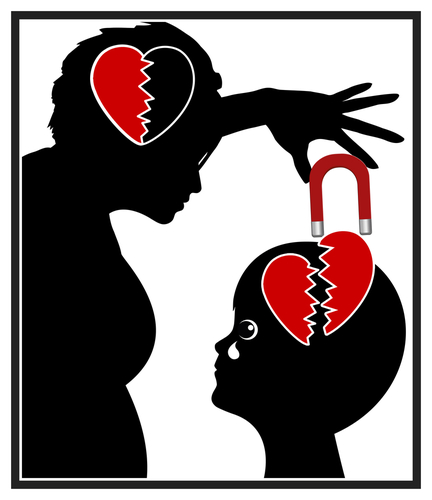What narcissist parents say wires their child’s brain and the way they experience the world.
Positive talk contributes to a balanced way of thinking and processing information. On the other hand, directive, cold talk alters kids’ sense of safety and self-esteem.
Narcissistic parents excel at making their kids feel unimportant, and language is one of the most powerful tools by which they do this. Unresolved self-esteem issues caused by harsh talk can continue when children become adults and turn into trust and communication difficulties. [Read Things Narcissists Say to Give Themselves Away]
In this article, you’ll find out more about the phrases and attitudes that narcissistic parents use in interactions with their children that cause these problems and how they impact their child’s emotional wellbeing.
The Harmful Messages of Narcissistic Parents
“You’re wrong to feel or think that way.”
Dr. Les Carter (2008), author of Enough About You, Let’s Talk About Me, studies the speech tendencies of narcissists. This phrase expresses the grandiosity and lack of empathy that are specific to this way of functioning. [Read: The Unlucky 13 Different Types of Narcissism]
When narcissistic parents say this to their children, they send a message that their kid’s needs are different from what the parent thinks they should be. Children learn their own impulses and judgments are irrelevant or wrong.
Continually exposed to such a speech, the kid will learn that he is not allowed to have an opinion. Instead, they believe they should rely on someone else to verify the accuracy of their thoughts.
“It is imperative that you meet my needs and requests.”
According to Carter, narcissists have a very clear idea of how they should be treated. It is unacceptable to them when those expectations are not met–even when it comes to their children.
They may say things such as, “If you don’t do that, I will be hurt” or “If you behave that way, I will be very happy” with an attitude of entitlement.
A child raised under such influence can become an adult who is people-pleasing. They may always put others’ needs in front of their own.
“I can’t believe you think that way. It’s so stupid.”
Since they lack empathy, narcissists will not hesitate to use verbal insults toward others. What narcissists say is especially hurtful when it’s a response to an open display of emotions.
Emotional outbursts or expressions are normal for children. When the child experiences a powerful feeling, their narcissistic parent’s rigid response can invalidate their whole reality. This can make them feel insignificant.
A child who did not receive proper validation when confronted with big emotions will be untrusting with any environment. She may have trouble asking for help and consider herself unworthy of affection.
“I help you, so you will help me.”
Narcissistic parents will show affection and openness to their children as long as it serves a personal purpose for them.
For example, they can be very affectionate and caring in public to maintain a certain image. The narcissistic parent will use their friendly behavior later to obtain advantages, like specific behaviors or help from their kids.
If you recognize this as a general practice your parents used during your childhood, you may now be experiencing trust issues, low self-esteem, difficulties expressing yourself, and fear of abandonment.
“If you compare me to other parents, I am way better than most of them.”
This is a phrase narcissists use in various forms to minimize the child’s experience and to avoid receiving feedback. [Read: Word Salad: When Talking is a Narcissist’s Weapon]
If their kid or adolescent comes to them with a complaint, they are likely to address it in a manner that will imply the message, “You have no right to complain, not about me.”
This kind of discussion may leave the kid questioning his own intentions. The child may have feelings of inadequacy and loneliness.
These thoughts and emotions could come up later as intimacy difficulties and self-esteem struggles.
What Narcissist Parents Say Matters
What narcissist parents say to their kids becomes their own inner voice and a model for experiencing the world.
If that inner voice is constantly telling you that others are more important and you are not worthy of love or even attention, your body and psyche will react with depressive episodes, intense anxiety, communication, and relationship problems.
If you identify constant negative self-talk, you should know it is possible to change your inner voice to be more balanced and realistic.
Join the community to get more articles like this one delivered straight to your inbox.
If you like this article, you’ll also enjoy these:
- 7 Narcissist Lies That Are Easy to Spot
- Narcissist Gaslighting Examples in Romantic Relationships
- Idealization and Devaluation: Why Narcissists Flip
- The Unlucky 13 Different Types of Narcissism
- A Letter to the Narcissist Who Destroyed Me
Source
Carter, Les (2008). Enough About You, Let’s Talk About Me: How to Recognize and Manage the Narcissists in Your Life. Jossey-Bass, San Francisco.





